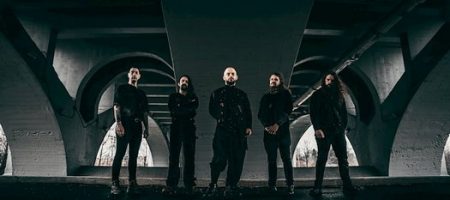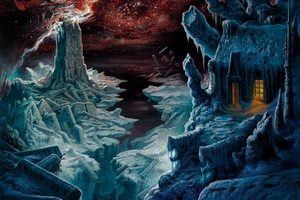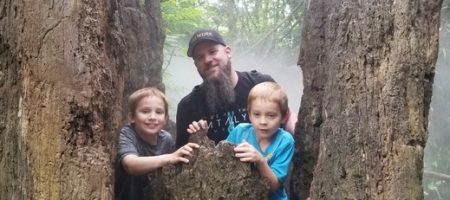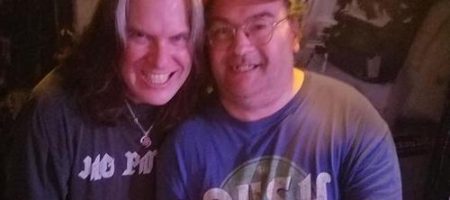Rivers of Nihil – Forward unto the Fall
Sunday, 4th March 2018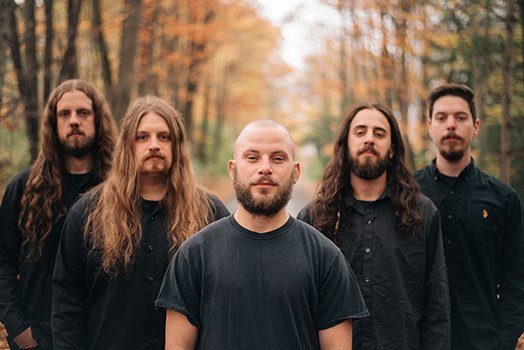
A band that seems to be able to quite comfortable in adapting and evolving their sound, it’s been quite interesting to see Pennsylvania’s Rivers of Nihil progress since their first full-length release back in 2013. While it’s only been five years, each new full-length effort has brought forth a new side to the band, while keeping a piece of their core intact (even more impressively if one has heard their first EP material). Adding to this is their seasonal concept, tying everything back together. Starting with spring, Monarchy saw them move into the summer, and now Where Owls Know My Name sees them enter the fall.
As their third album, Where Owls Know My Name is another gigantic leap for Rivers of Nihil. Running with the atmospheric and emotive qualities of Monarchy, there’s more progressive elements this time around, not to mention the introduction of both clean vocals and prominent saxophone in a few tracks. But it all works, taking Rivers of Nihil into a place that very few death metal bands occupy. We had a chat with guitarist Brody Uttley to get some insight on these moments and more.
Dead Rhetoric: I really liked Monarchy, and it feels like you have taken the emotional aspect and taken it to the next level with Where Owls Know My Name.
Brody Uttley: That’s good to hear. We were kind of worried that we would lose some people with the newer stuff. We thought we might lose the people who were really into Monarchy, because certain parts on the new record get so ‘strange,’ so that’s good to hear.
Dead Rhetoric: Going along with that, in what ways do you feel the band has progressed and changed since its inception?
Uttley: When we started this band, which will be 10 years old in 2019, we were more or less just kids that were really stoked on making music that was as heavy as we could possibly create. We were really big into the tech death and slam bands of the time and we really worked that into our sound early on. Over the years and through a few line-up changes, we’ve realized that there’s more out there that we like to listen to.
What it comes down to, especially on this new record, that there’s not to many bands out there in our genre that are playing music that I would listen to on a regular basis. There’s several of them that are, but a lot of bands aren’t really doing what we are super interested in, so we figured we might as well try to make music that we would want to hear. I know that’s really stereotypical to say, but it’s the truth. We all listen to a lot of music that’s not metal necessarily. Not that we are intentionally trying to bring those influences into our sound, but it just kind of happens naturally.
Dead Rhetoric: If you were to go back to the start ten years ago, would you have imagined this sort of progression for Rivers of Nihil?
Uttley: No, probably not at all. I was actually at one of my friend’s studio the other day who recorded one of our first EPs and he was playing it for me. It was huge slams and straight blastbeats for three minutes. Then he played one of our newer songs right after that and I was just laughing because it was such a different sound. We all listened to different music that wasn’t metal, but I think back then we weren’t really experienced enough as writers to know how to venture outside the walls of the genre of heavy metal. Through growing as people and musicians over the last nine years, we have gotten comfortable with doing things that are outside of the limits of heavy music.
I think it’s really just experience – so to answer your question…no, if you played me a song off this record and it was back in 2009 when we started, there’s probably no way I would guess that it was our band. Aside from the fact that we still tune our guitars obnoxiously low and we have the same singer, I don’t really think that a lot of the early sound (the EP days) has made it to now. If you play our first full-length on Metal Blade [The Conscious Seed of Light] and you play the new stuff, I think some of it lives on, but I think the earliest stuff we did is so completely removed from where we are now.
Dead Rhetoric: Did you use the framework from the last 3 tracks off of Monarchy when you approached the atmospheric part of the new album or was it just a natural progression?
Uttley: The second half of Monarchy was the last part we wrote for that record, so I think the songwriting was naturally moving in that direction. The front half of Monarchy is pretty much just straight-up tech death at the beginning and as it goes on, it gets more proggy. But I think the progression was natural because we wrote the second half of Monarchy later on in the process – that was the direction we were headed. That’s how we started the new record. It was a continuation of what we started to write for the second half of Monarchy.
Dead Rhetoric: If you talk to most people about death metal, they think of it being very visceral and aggressive. But could you speak to the role of melancholy and sadness that’s been a part of your music and how you get them to play off each other?
Uttley: One thing that I’ve always tried to implement in my writing, especially on this record and maybe Monarchy, is realizing that heavy stuff is always going to sound heavier if the music isn’t just heavy all the time. That might sound silly, but at least for me, some of my favorite bands that write some super heavy moments have those moments surrounded by quieter moments. When we write something, we might start a song with a low-key, sad kind of vibe to it. That way, when we come back to a more traditional, ‘bring the hammer down’ kind of heavy metal sound, it just feels that much bigger. It’s a dumb example, but think about a lot of bands that just play breakdowns for an entire song versus a band that might write a full song that has one breakdown in it. Chances are pretty good that the one breakdown is going to hit that much harder than the band that has been playing a breakdown for 4-minutes.
I feel a lot of my writing is about dynamics and give-and-take. I have always thought it was important to have both elements. If you listen to The Dark Side of the Moon by Pink Floyd – “Us and Them” starts off with a completely relaxed and subdued piano line. When the chorus comes in, it hits this huge wall of sound…this huge emotional explosion. I think that the reason parts like that have historically worked so well is because those bands are the best at doing that. They have realized that it’s about letting things breathe and having dynamics. That way, when you want to go to 11, you can really go to 11.
Dead Rhetoric: Can you talk about the continuity in place for “Terrestria III,” as I know that I and II shared some connections?
Uttley: The Conscious Seed of Light started with “Terrestria I” with this guitar line and melody, which comes back in Part II. It’s kind of hard to pick out unless you are really listening; it’s the same melody but just a reprise. It also comes back in “Terrestria III” as well. You can hear it towards the end of the song. The whole goal with “Terrestria” is to have this familiar song title on every record that brings back that melody which started our very first full-length. It’s more or less an easter egg for someone who followed the band since day one. It’s sort of like in Lord of the Rings, where there’s a scene in which Peter Jackson walks across the screen eating a carrot in the village of Bree. In The Hobbit, they are in Bree, and Peter Jackson again walks across the street eating a carrot. A lot of people don’t notice that, but for those who have been following they do. It’s the same thing that we are trying to do with music.
Dead Rhetoric: So you can predict that there will be a “Terrestria IV” in the future.
Uttley: Yeah, that’s the plan. It would be a four-part thing. One for each season.
Dead Rhetoric: This is probably the question that everyone has been asking you, but how did the decision come about to include saxophone, and what do you feel its impact was?
Uttley: The saxophone thing happened just by chance. I record bands locally, and one of the bands’ guitar player was going to school to be a sax performance major. He’s actually a teacher now. He told me what he was doing for university band and whatever. So I thought that maybe one day he could play on our records. The first single that we released [“The Silent Life”] was one of the first songs that I wrote for the record. That song has a big open section in the middle before the guitar solo, and when I wrote it, it sounded kind of empty. So I got thinking that maybe Zach [Strouse] could come over and lay down some saxophone. He came over and recorded a few takes of a sax solo and I sent it to the other guys, not really knowing what they would think, but they loved it. We kind of kept it and made him part of the record.
Saxophone is an instrument that I’ve always really enjoyed. On all those old King Crimson and Pink Floyd records, some of my favorite moments were sax parts. It’s an instrument that I’ve always wanted to have on a record of ours but I never really imagined that it would happen so naturally, or that I would meet a guy who was a killer sax player and was also into heavy metal.
Dead Rhetoric: The other thing on the new album is that you put some clean vocals in, which sometimes gets bands into trouble when added later on in a band’s existence – was it important that they felt completely natural and only used when the time was right?
Uttley: The thing with the clean vocals – [Adam] Biggs, our bass player, he’s the guy that writes the lyrics. I’m the guy that pretty much puts music together and he puts lyrics to them. He and I had discussed the possibility of putting clean vocals on the record. To be honest with you, I was very resistant to the idea. I was in this “Fuck that, it’s stupid! Every band does that! Why should we just cave in and do it, it’s stupid” [mindset]. I was kind of a dick about it. But when we were recording the record, they were in the other room working on vocals, and I popped my head in to see what was going on, and I heard the clean vocals totally by surprise for the first time.
I was shocked at how easily it worked. Then I thought about it and why I was resistant to having clean vocals. I realized that it didn’t have anything to do with me not liking clean vocals, it just had to do with the stigma of death metal bands doing that. I thought it was a stupid reason for me to not want to put that element into our music. Why would I want to let that influence a piece of music that we were creating? It was a strange thing. Obviously we have a part on one of the later tracks where Andy Thomas from Black Crown Initiate does some guest vocals, and he’s from our home town. Fun fact: our bass player’s girlfriend is actually Andy’s sister. So Andy has been a good friend for years. He came by the studio one day and did some vocals for us and it felt like a natural thing. We tried it, and Biggs said that if it didn’t work we wouldn’t do it, but when I hear them, it’s not like, “Oh, that’s clean vocals.” It’s more like a texture when I hear it. It’s adding to the overall atmosphere of the record.
Dead Rhetoric: How important has the consistent artwork from Dan Seagrave been in solidifying the seasonal concepts?
Uttley: He always does really sick work. We trust him with delivering. He’s totally aware of the seasonal concepts. That’s the reason we started working with him. With our first record, we sent out our conceptual pitch and nobody really got back to us except Dan, who was super excited about the idea. There was actually a point in the creation of this record where we thought we wouldn’t be able to work with him because he was so booked up. We were about releasing it without his artwork on it, because he just feels like part of the team. His artwork feels like part of what the band is. Luckily it worked out and he did the art for us, and it came out awesome.
He’s pretty good at demonstrating what season we are on in his art in ways that aren’t obvious or silly. He’s not painting pumpkins on our art or anything. He’s always done a great job of conveying not only the season we are on, but also the tone of the record. This cover has this sad, old entity on the front who has become woven into the nature that surrounds him. A lot of the lyrics are about this character that’s on the front of the album. Dan really nailed the artwork; he’s just a huge part of what this band is.
Dead Rhetoric: As you mentioned, you do a lot of recording for local acts within the scene. Do some look to you as sort of a father figure in terms of what to strive for in terms of being ‘successful’ [in death metal terms] as a band?
Uttley: I’ve seen dudes that get that way. They parade around – ‘my band changed shit around here and I’m a real influence on these damn kids’ – I’ve seen guys get like that and I think it’s kind of lame. I know that there are bands in our area that hit us up. They are at shows or whatever and they’ll come up and ask what we are doing and tell us favorite [Rivers] songs. I get asked to do guest solos from bands from the area. If I was to think in that way, then we’ve had somewhat of an impact on the scene, but I really try not to think that way. Like I’ve said, I’ve seen guys that let that mentality overrule their life and it’s a bad look. It’s an embarrassing thing to have to see. But bands in the area that have expressed that they we have influenced them or changed things for them in certain ways. But I try not to think of it that way.
Dead Rhetoric: Obviously album four at this point will be the winter theme. Have you talked much about your plans for this release, knowing it’s the end of the line for this particular series that you started?
Uttley: Not really. There are some ideas that have been tossed around for the last record. I know that Biggs, being the conceptual wizard that he is, he’s always thinking ahead. I think that for the winter record, at least artwork-wise, he has a minimalist approach in mind. Winter having things being in a state of hibernation and death. But as far as actual concepts goes, he hasn’t really talked too much about it with me. I’m always interested in what he has planned, it seems like he has this huge back catalog of ideas rolling around in his head.
Dead Rhetoric: You have a tour coming up with Dying Fetus, what else do you have planned for the year?
Uttley: Nothing solid yet. I think people can expect to see us shortly after this tour, in the coming seasons. This tour [Dying Fetus] goes for 5 weeks and it’s perfect timing when the record comes out, so I think it’s a good time for people to come out and see us.












